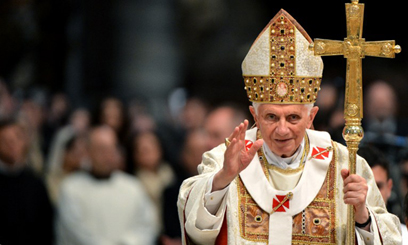The synod will hear a call from Pope Benedict XVI for a “new evangelisation” drive for the Catholic Church, which is fast losing followers in Europe and feels increasingly discriminated against in many parts of the world.
The synod lasts until October 28 and coincides with the announcement on October 11 of a “Year of Faith” to mark the anniversary of the start of the Second Vatican Council (1962-1965), which changed the face of Catholicism.
The now 85-year-old German pontiff, who was an expert at the council known as “Vatican II” and one of its most reformist voices, has made the new evangelisation a centrepiece of his papacy since being elected in 2005.
The synod will also look at tensions against Christians in some parts of the world including on the part of radical Islamists, as well as increasing competition from evangelical churches particularly in the developing world.
The last synod on evangelisation was called by Paul VI in 1974 but the crisis of faith in traditionally Christian countries was not as strong then.
The Vatican earlier this year revealed the answers given by bishops to a questionnaire asking them to identify obstacles in spreading the Gospel.
Some talked about the problem of “excessive bureaucracy in Church structures”, others said “liturgical celebrations were devoid of deep spiritual experience” or that the problem was “an insufficient number of clergy.”
A 35-year-old priest at the time of Vatican II, Joseph Ratzinger became more conservative after witnessing the excesses of the Sixties and now aims to correct interpretations of the Council that he sees as deeply erroneous.
“Faith has to come out of its cage, it has to face the present with a new language, a new opening,” the priest said at the time.
Ratzinger in those years was a theologian bursting with new ideas who took an active part in discussions on the possibility of allowing divorcees who re-marry a place in the Catholic Church and even allowing priests to marry.
He was committed to allowing masses to be celebrated in the vernacular instead of Latin and criticised the Vatican for being stuck in the past.
“Faith has to come out of its cage, it has to face the present with a new language, a new opening,” the priest and theology professor said at the time.
But then came 1968 — a traumatic year for Ratzinger when students at his faculty interrupted professors and mocked dogma in the name of revolution.
When he was called by late pope John Paul II in 1981 to lead the Congregation for the Doctrine of the Faith, the main enforcer of Church dogma, Ratzinger started to crack down on leftist-inspired theologians and priests.
Since being elected pope, he has called for evangelisation through an increase in prayer communities and a bigger spotlight to be put on women in the context of their families and parishes as crucial protagonists.










































